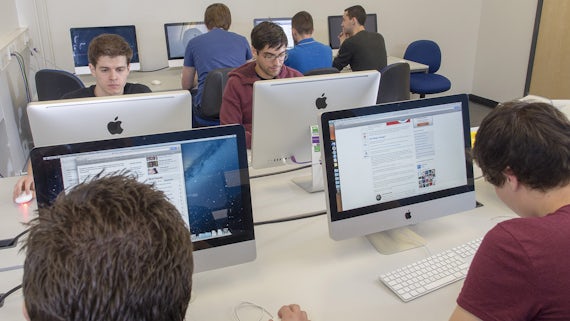Cardiff joins AI Doctoral Training Centre
21 February 2019

Cardiff University is joining a new Centre for Doctor Training (CDT) to help create a new generation of leaders in Artificial Intelligence (AI).
Led by Swansea University and funded through UK Research and Innovation (UKRI), the CDT will specialise in AI, Machine Learning and Advanced Computing, and operates in close cooperation with Supercomputing Wales.
A total £200m UK investment will create 16 new UK Centres with 1,000 PhDs to transform AI, working with partners including AstraZeneca, Google and Rolls-Royce, and NHS trusts.
Roger Whitaker, Professor of Collective Intelligence and Dean of Research in Physical Sciences and Engineering, said: “We are proud to be key partners in training the next generation of experts in AI. This involves researchers from across all our three Colleges at Cardiff, in areas where AI is already having a significant impact.
“Led by Professor Gert Aarts at Swansea University, the CDT will engage with data from large science facilities such as the Large Hadron Collider and Laser Interferometer Gravitational-Wave Observatory (LIGO); biological, health and clinical sciences; and novel mathematical, physical and computer science approaches to train doctoral researchers who can make an impact across a wide range of disciplines and industries.”
The Wales CDT will see PhDs work across a range of Cardiff specialisms including:
- Supercomputing Wales – a £15m programme funded by the European Regional Development Fund through Welsh Government allowing university research teams at Cardiff, Swansea, Bangor and Aberystwyth to access powerful computing facilities.
- The Medical Research Council (MRC) Cloud Infrastructure for Microbial Bioinformatics (CLIMB) project across four universities – Cardiff, Swansea, Warwick and Birmingham – to create a public/private cloud for use by UK academics.
- Gravitational Waves – a supercomputer at Cardiff's School of Physics and Astronomy helped researchers in the Gravity Exploration Institute confirm signals detected by LIGO.
- Cardiff University’s Crime and Security Research Institute, in cooperation with the International Technology Alliance in Distributed Analytics and Information Science (DAIS ITA) - set up to unlock the potential of big data analytics and AI in front line situations.
In addition to £100m announced today through UKRI, project partners are investing £78 million in cash or in-kind contributions and partner universities are committing a further £23 million, resulting in an overall investment of more than £200 million.
UKRI Chief Executive, Professor Sir Mark Walport,said: “Artificial intelligence is a disruptive technology in a range of sectors, enabling new products and services and transforming data science. It allows us to develop new approaches to challenges as diverse as early disease diagnosis and climate change.
“To maintain its leadership in AI, the UK will need a new generation of researchers, business leaders and entrepreneurs equipped with new skills. Working with partners across academia and industry, the centres announced today will provide the foundations for these future leaders.”
Share this story
The School is research-led with a reputation for excellent teaching and internationally accomplished research activities.






